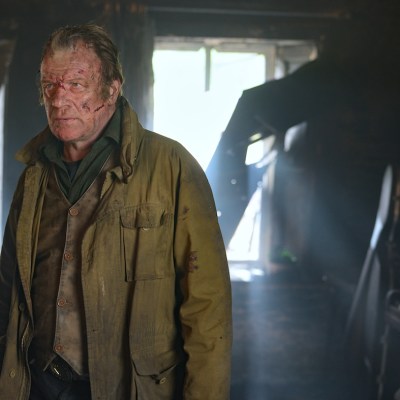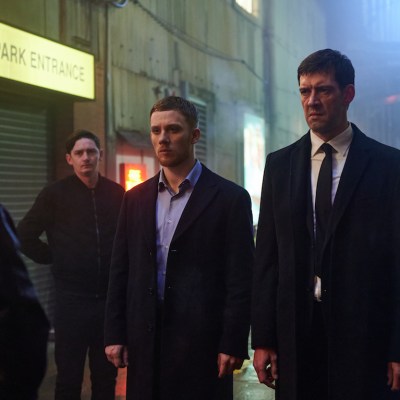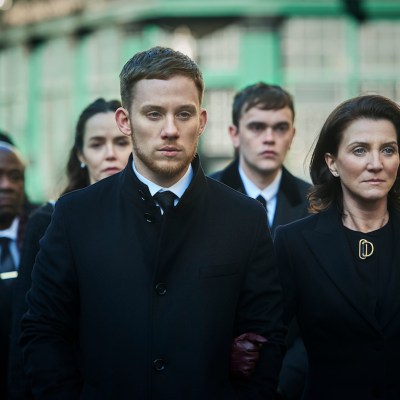Gangs of London: Torture, Luan vs Mosi and the Fall of an Empire
Xavier Gens, director of Gangs Of London episodes 6, 7 and 8 talks us through the build up to the finale
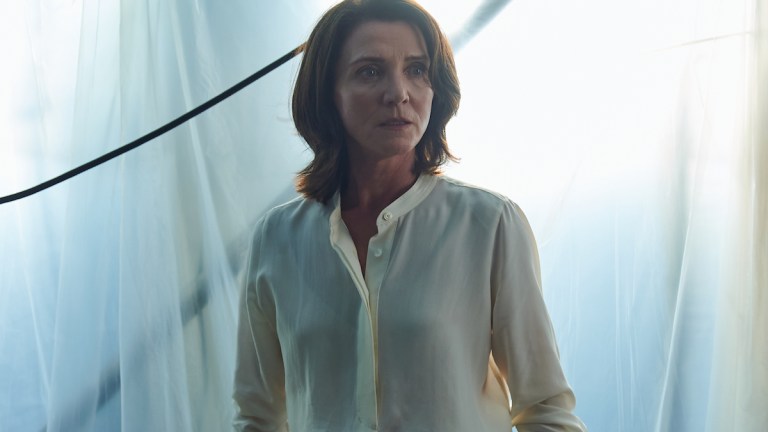
*Warning: Spoilers for episodes 1-8 of Gangs of London to follow*
“I received the episodes and I read six first and I was like, ‘Oh, I understand why Gareth wants me to do that,’” laughs Xavier Gens talking to us via Zoom from lockdown in Paris. The French director took charge of ‘block four’ of epic crime drama Gangs of London, which sees the decline and fall of the Wallace and Dumani clans leading up to the dramatic end of season finale.
Episode six might as well be dubbed ‘the torture episode’. After the countryside siege that dominated Gareth Evans’ episode five – a standalone that acts as a pivot point for the series but exists in the timeline directly after episode two but before episodes three and four, six takes us back into the linear narrative armed with new information.
Namely: Jevan (Ray Panthaki) ordered the hit on Finn Wallace (Colm Meaney). A group of Danish militia turned mercenaries contracted Darren (Aled ap Steffan) from the Welsh traveller gang to carry out the hit. And it was the Danes who made it their mission to clean up loose ends by destroying Darren, Mal (Richard Harrington) and Kinney (Mark Lewis Jones), the last of the travellers, losing many of their own group in the process.
Now the remaining Danes have a new target – another son, as Jevan puts it in episode five – Sean Wallace (Joe Cole). The out-of-sequence fifth episode provides answers to the chaos of episode four. The Chinatown ‘corridor of death’ shootout, where Mark (Adrian Bower) is killed and Elliot (Sope Dirisu) is shot was orchestrated by the Danes. When that fails to take out Sean they have a back up. Tove (Laura Bach), whose partner was killed during the Welsh siege, has been planted as a waitress at the Wallace family dinner. But before she can complete her mission and kill Sean she herself is taken out.
Here we find ourselves in episode six. The Wallaces have moved into a safe house the address of which is kept secret to everyone but the family – not even the Dumanis know where they are. And it turns out Tove wasn’t killed in episode four after all. Now it’s Marian Wallace’s (Michelle Fairley) turn to defend her family by attempting to torture the truth out of Tove, and take out some inner rage too.
Step up Gens, best known for his furious, visceral New French Extremity movie Frontier(s) as well as contained and impossibly bleak post-apocalyptic horror The Divide. Stands to reason that this block would belong to him. But there is far more to block four than torture.
“When you do a block of a series like that, you try to figure out what’s going to be the heart of the storyline you are telling,” explains Gens. “You try to make it as a long movie. It was important to read what had been done before, and work out what I could try to tell through these three episodes. I was talking about the mother/son relationship and the disintegration of the family. And at the end of eight, there’s the disintegration, visually, of this family, because Sean is destroying the world. So, it’s really all symbolic of what happened to the Wallace family at this moment.”
If the dissolution of the family is the arc of eps six to eight, when it begins they at least have some semblance of unity. After the open fields and epic shootout of episode five, we’re now in an entirely domestic setting. Billy busies himself with baking, Sean has called for Elliot to visit and Marian has her own project going on in the bedroom.
“For me it was most important to drive all the emotions and what happens in the present for the characters,” says Gens. “For Marian Wallace it’s about her frustration at the betrayal she felt over Finn wanting to live with another woman – her husband cheating on her. She was one of the main pillars of the Wallace family, and so really when she’s torturing Tove, she is torturing Finn Wallace. She sees Finn in that woman. I really wanted to figure out how I could express that Lady MacBeth figure into the character of Marian Wallace.”
Gens says the challenge was to find a way to maintain a build-up throughout episode six so that Marian would breakdown completely by the end, and while the torture gets more “deranged and disgusting” according to Gens, it’s Fairley’s performance that carries it.
“She’s probably one of the brightest people I have ever met,” says Gens, explaining that he was already a fan of Fairley’s because of her work in Game Of Thrones.
“She arrived and she’s got that scary smile,” he laughs. “The first time she arrived in the room I was more like a fan. But I was like, ‘Okay, fan, shut up. Just do your work.’”
He says that Fairley’s instinct was to pare back some of the lines saying she could express them with just a look. “She has such a strong look. Just the eyes are so expressive,” Gens recalls.
“There is a moment when there’s this big argument between her and Joe Cole, between Marian and Sean. The fight when he says to her, ‘We don’t need you anymore’ and she just looks at him. In that moment I was really blessed because she makes my job so easy. She gives that look to him, for so long without blinking. You feel all the frustration of the mother who has lost control of her son. I had goosebumps at this moment. You follow her lead. You follow her pacing, the rhythm she brings on set, and it really makes my job easy, to be honest.”
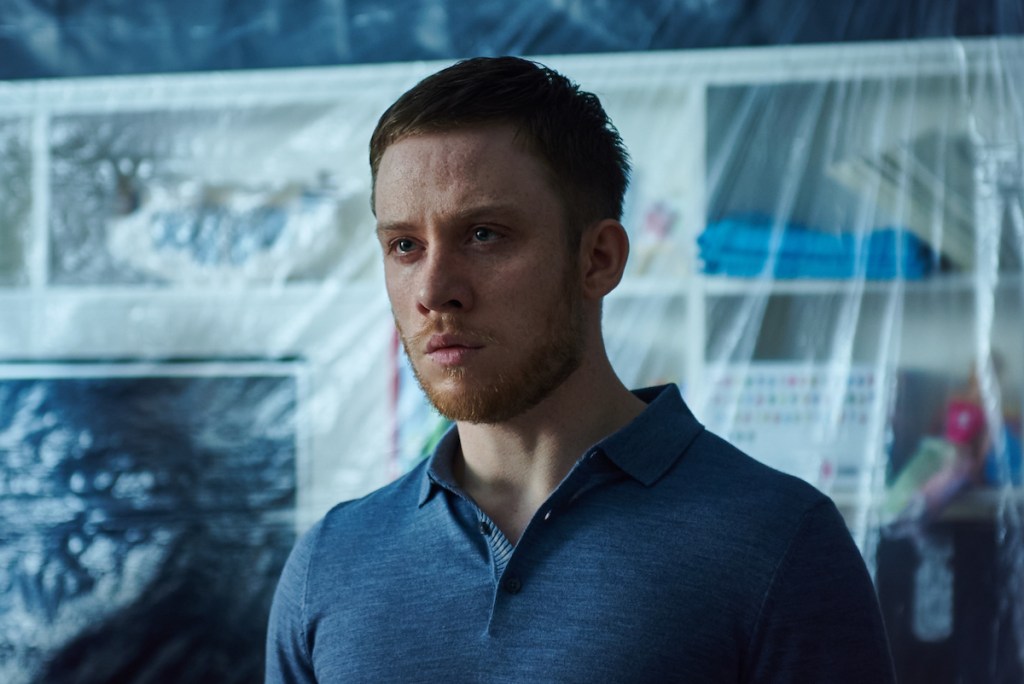
While Marian’s escalating rage is focused on Tove, Billy (Brian Vernal) is slowly losing his mind downstairs as he tries to cope with his heroin withdrawal symptoms.
“He’s not feeling like a Wallace anymore,” Gens explains. “He really wants to understand what’s wrong in his family, and he tries to confront his brother. Basically he’s destroyed by that scene when he has to shoot instead of Sean.” Gens is referring to the scene in episode two where Finn takes the young brothers out into the woods and attempts to make Sean shoot an upturned bucket under which is revealed a man’s head – he’s buried up to the neck and still alive. But Billy takes the shot instead to save his brother.
“The character of Billy, for me, was really to figure out, ‘Oh, I can find that lost child.’ And I was always thinking about that when I was directing him. It’s like he’s an orphan. He’s with that family but he’s completely lost in between two worlds. Between that criminal world, and those very intimate things we all need when we are children.
“We need love and this guy never had love in his life and you can feel it’s why he is destroying himself, because he has such a lack. I think that’s a beautiful motivation. When you see him at the end of seven when he’s looking at the family after the split all around. He gets so emotional at this moment because he understands, he has to make his own decision and leave this family. It’s not for him anymore. When he’s looking at Sean and Marian and then he looks away because he understands he will never feel that. She will never take him in her arms, and that’s something he will never know. Brian is fantastic – he’s so emotional, so strong, and so sensitive. It’s a pleasure to work with people like this.”
Part of the torture of episode six, both literally within the show and figurateively for the audience, is the repetition of the song ‘Only You (And You Alone)’ by The Platters, played by Marian to drown out Tove’s screams, which becomes a leitmotif for Tove and Marian’s pain.
Gens says that Lauren Sequeira who wrote episode six listened to the song constantly while writing.
“She tortured herself by listening to the song all the time,” he tells us. “It gives us the pace of the episode. It was quite tricky because after five, which is a big action episode, with a very contained episode coming just after that big bang you wonder ‘how can I be as good as this one?’ I was like, ‘Okay, let’s figure out. Let’s think about Roman Polanski, Michael Haneke, all these great directors I really admire for their work. Let’s try to figure out how I can work on something very contained, and try to figure out how to use that music as a gimmick, and also to make a different pace. Let’s go completely to the other side of the possibilities.’”
The whole episode has a domestic horror vibe which was certainly suited to Gens and makes for an interesting change of pace after five. But with episode seven Gens needed to expand the action out once again.
“It was quite difficult, ep seven, to set up,” he says. “I really like ep six and it was so easy because I had to focus mostly on one point of view. Ep seven I have to set up everything for eight and nine. We are coming back into the typical serial episode, where you have to start a new storyline, and you have to set up many elements. So, it was really more a buildup in the pace to figure out how to set up everything and to bring the revenge of the Mosi to the table, and the relationship between him and Luan.”
Luan (Orli Shuka) is of course the Albanian boss working with Mosi (Richard Pepple), head of the Nigerians. Luan and Mosi had entrusted the Wallaces to wash 1.5 billion which was to be used to build a tower but now the money has vanished. Mosi is not a man to be messed with and when he arrives in London all hell breaks loose.
“I saw what Gareth did in the previous episode. I saw what Corin did as well in episode four, so that investment bank massacre, I was just in Korean movie mode and I thought let’s make it in one shot. Just one long sequence shot. Very steady, very slow and Mosi’s super calm at this moment. He’s not excited by the blood, he’s just into his revenge. It’s a cold revenge. What he wants is his money they stole from him so they’re going to pay.”
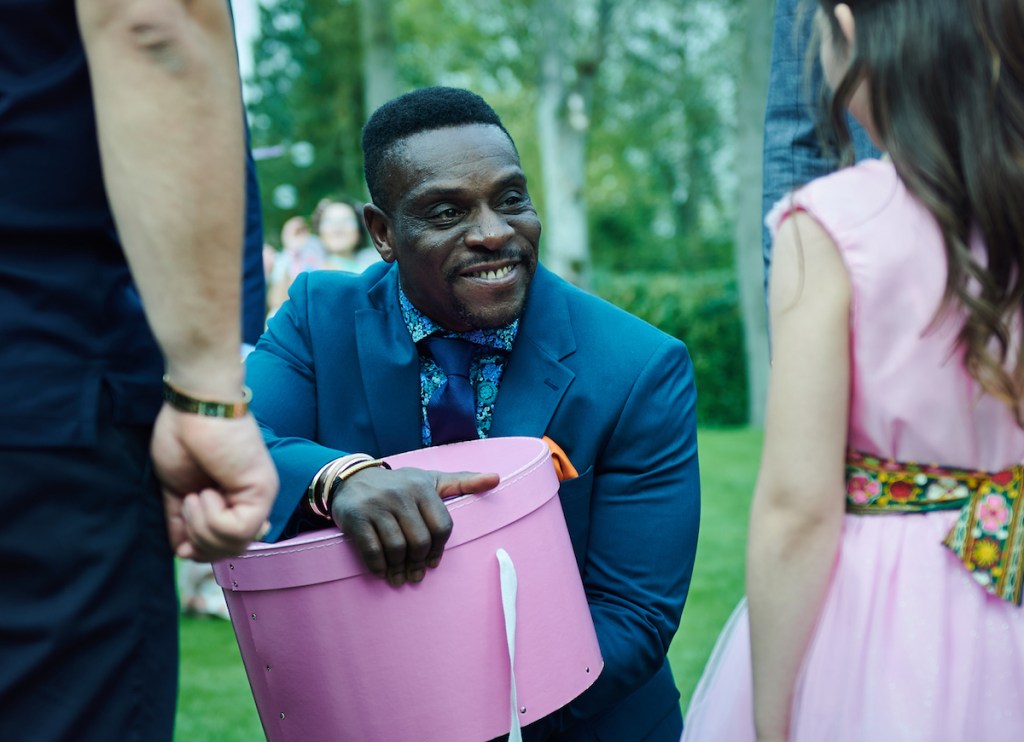
It’s a chilling sequence as Mosi and his gang chop off the hands of the investment bankers who were handing his money – a shocking clash between the clean, buttoned up world of the financial district with a force of nature like Mosi who enacts his revenge with blades calmly and systematically. He might be the scariest character in the show so far.
“Because he is so cold and pragmatic,” Gens agrees. “He’s doing things in a very easy way. He’s just like, if you’re fair with him, you don’t have any problem with him. But if you’re not fair with him, he is going to kill you.”
In episode eight after Mosi has shown Luan he means business the stakes are even higher for the Albanian. So when Mosi and Luan clash it’s a completely different energy in the room from any of the fights we’ve seen before.
“We had a very tight schedule for that, we had only one day to make it,” Gens explains. “So I talked to the amazing Jude Poyer, the stunt choreographer of the entire show. He is really fantastic, I told him, ‘Okay, I have one day to shoot that fight. What do you think we can do in one day?’ We were talking about what the character is feeling. Luan at this moment is enraged. The rage is so strong he has to get rid of these people as fast as he can to save his daughter and his wife.
“Basically Mosi tells him, I’m going to kill your daughter and your wife, and he came to the daughter’s birthday party. I was putting myself into the skin of Luan at this moment. How would I feel? I would be like the lion. I was talking to Luan and saying to him, ‘okay, you’re going to be a lion in that scene.’ The lion kills quickly. If you look at the fight, the fight is between 30 and 40 seconds on screen. It’s very fast. But it’s about violence and rage. There is a central rage, and for me the most important point was where Luan kicks Mosi against the door, and he is yelling at him, looking at him in the eyes, and he scratches his face like this…,” Gens gestures to indicate the eye-gouge moment.
“For me that moment was a summary of the rage he is feeling, the anger he is feeling, and so it shows Luan can be a beast, can turn into a beast if you push him to the limit. That character can be very dangerous later on. Very, very, dangerous. Much more dangerous than we think, so that fight became a narrative tool to tell something about Luan, and also to feel the rage of the character. For me it was so important that at the end of the fight you are with him and you want to stay with him, and you’re like, wow, okay. This is a man that fights for his family, and not in a very clean way, but he has to do it.”
It’s notable that after this fight, unlike any of the ones we’ve seen before, Luan leaves completely wired, shaken up and distressed.
It’s in episode eight we also get to see a bit more of Floriana (Arta Dobroshi)- Finn’s lover who was carrying his child. Though Jevan told Ed (Lucian Msamati) that Floriana was killed the same day as Finn, that’s not the case. Instead Leif (Mads Koudal) and his mother (Sharon Morgan) have been holding her hostage in their basement with the intention of extorting the Wallace’s money once Floriana’s child is born. Floriana gives birth and manages to escape her captivity by pushing Leif’s mother down the stairs, tearing out of the house and down the street holding her baby. It’s a scene that’s strikingly reminiscent of a shot from Gens’ Frontier(s) where our heroine Yasmine finally escapes her torturous captors – notable but not a deliberate choice according to Gens.
“I didn’t talk about it, but it came naturally I think,” he says. “This scene was shot after we finished the main photography. We needed to see Floriana escaping, and that was the same thing, the camera sticks to her, and it’s hand held and it’s that feeling of panic. She’s lost and panicked, and she has to protect her baby. The only strong instinct here is a survival instinct and as Frontier(s) is a survial film I think it’s really those survival feelings were popping up at this moment.”
The closing beats of episode eight have a very different feel. With help from Lale (Narges Rashidi) Sean has rigged explosives to destroy the Wallace skyscraper and after talking to Alex Sean truly fulfils the prophecy of becoming the ‘boy who would watch cities burn just to prove he’s a man’ as he was described in episode one. It’s all set to Pavarotti singing ‘Nessun Dorma’ from Puccini’s opera Turandot.
“This is a moment where you are telling your brother, ‘it’s done and I am destroying everything we had. I love you but you betrayed me. You betrayed me and I am not part of this family anymore. My father who is dead now doesn’t want me to be part of the company.’ He is like a rejected kid,” Gens explains.
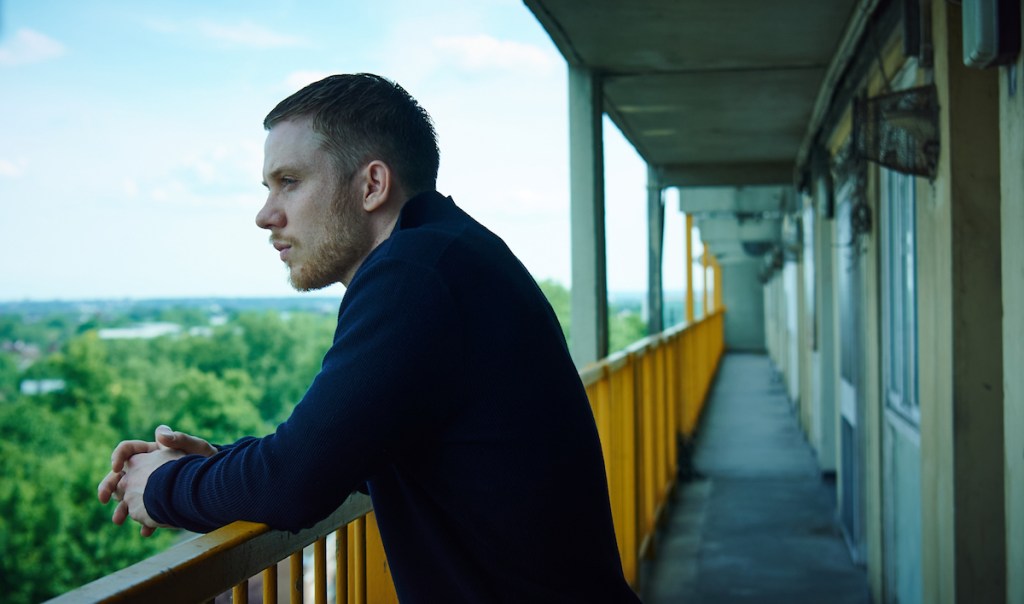
“I really wanted to connect to the emotion of Sean at this moment. He’s that Hamlet figure basically who feels betrayed and really wants to destroy the world. I think that music was so beautiful even if it’s a little bit cliche at some points. I wanted to feel that anger, the power of that anger, and finally that anger is as powerful as the storm. There is like a kind of a divine figure as well because there is a storm coming over London.”
It’s a scene that might draw comparisons to an iconic moment in David Fincher’s Fight Club which Gens acknowledges but his main reference point for the arc that’s run between Alex and Sean is a more classic one. That of Romulus and Remus, twin brothers who were the founders of ancient Rome, whose story ends with dispute and the murder of one brother at the hands of the other.
“This is Romulus and Remus destroying a city – London is Rome and this is the two brothers fighting against each other. Sean is like that angry teen, a young adult who wants to avenge his father, but by the end he understands so much about who he is and why the Wallaces represent something wrong to that city. He goes rogue and is becoming an anarchist. He wants to create chaos over London.”
We end with a close up on Sean’s face, tears rolling down his cheeks.
It’s a truly epic climax to Gens’ block which sets up perfectly for the episode nine finale where everything finally comes to a head.

